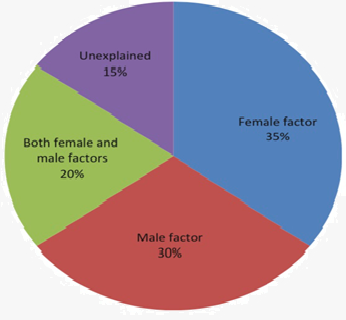Infertility is defined as not being able to become pregnant after having regular intercourse (sex) without birth control after one year (or after six months if a woman is 35 years or older).
Primary infertility is infertility in a woman who has never had a pregnancy
Secondary infertility is infertility in a woman who has had one or more pregnancies, but cannot become pregnant again.
It affects one in seven couples

It has been estimated that one-third of all causes of infertility originate in the female, one-third in the male, and the remaining third are attributed to combined female and male factors.
For the woman, contributing aspects include diminished ovarian reserve, endometriosis, disorders of ovulation, uterine abnormalities, tubal disease, and unexplained infertility.
Men may experience spermatogenic problems related to both hypothalamic–pituitary impairment and anatomic testicular abnormalities and dysfunction.
The goal of treatment of the infertile woman goes beyond just simply helping her achieve a pregnancy, but rather the ultimate goal is the establishment of a pregnancy that ends with a healthy mother and a healthy baby.
An important prerequisite to infertility treatment is pre-conception counseling.
Pre-conceptional counseling is an assessment of the medical, social, genetic, environmental, and occupational factors that can affect fertility and the health of a pregnancy